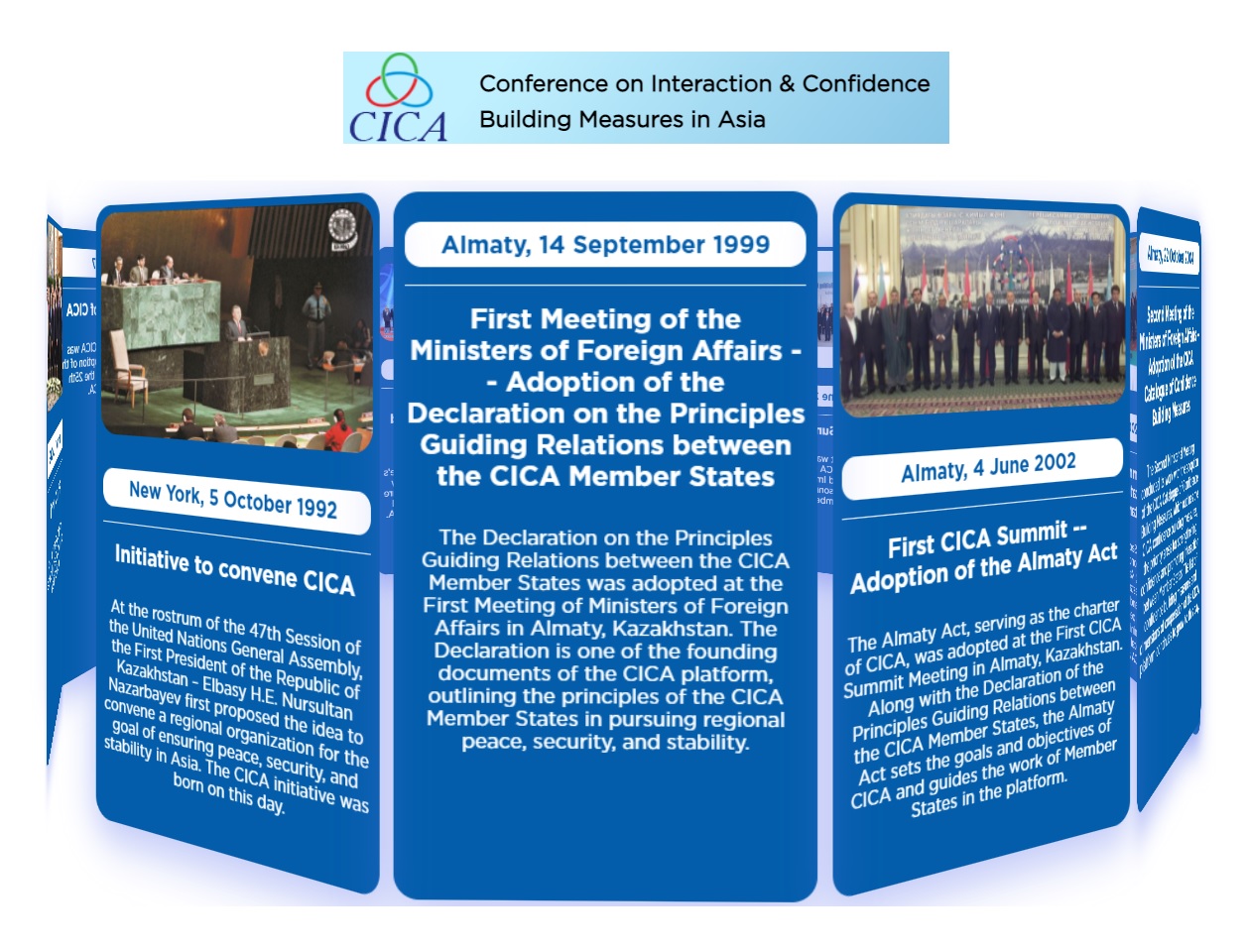The CICA is a useful forum, and India expressed its views in the 6th Ministerial, 2021, at Nur-Sultan, Kazakhstan.
- The story: The CICA (Conference on Interaction and Confidence-Building Measures) is an intergovernmental forum aimed at strengthening regional cooperation and ensuring peace, security, and stability in Asia. India's External Affairs Minister addressed the 6th Ministerial (2021) meeting in Nur-Sultan, Kazakhstan. In 2020, Kazakhstan assumed the chairmanship of CICA. The 5th Meeting of the Ministers of Foreign Affairs of the CICA was held in Beijing in the year 2016.
- Issues taken up:
- Cross border terrorism - Advised the forum to strengthen collective resolve to tackle terrorism, arms trafficking, narcotics trade, and other forms of trans-national crimes.
- Connectivity projects - Connectivity must respect the most basic principle of international relations - respect for sovereignty and territorial integrity. This was a direct reference to India’s objection to China’s ambitious infrastructure development plans in Pakistan under the China-Pakistan Economic Corridor (CPEC). The CPEC, which connects Gwadar Port in Balochistan with China’s Xinjiang province, is the flagship project of Chinese President Xi Jinping’s ambitious Belt and Road Initiative (BRI). India has repeatedly protested to China over the CPEC, it being laid through PoK.
- Vaccine Maitri - India's internationalism (Vasudhaiva Kutumbakam) drives its Vaccine Maitri. In January 2021, India launched the Vaccine Maitri (Vaccine Friendship) initiative, a diplomatic effort to gift and supply made-in-India vaccines to low-income and developing countries globally. It failed as the second wave hit India badly, soon thereafter. It was later resumed after many months.
- Multilateralism - Asia, Africa and Latin America are inadequately represented in United Nations’ (UN) decision-making. The limitations of the multilateral response to the Covid pandemic were starkly evident. This only makes a case for reformed multilateralism more urgent with each passing day.
- Afghanistan - India highlighted the importance of the Taliban regime meeting the expectations of the international community as elaborated in the UN Security Council Resolution 2593. The UNSC resolution 2593 unequivocally demands that Afghan territory not be used for sheltering, training, planning or financing terrorist acts; and specifically refers to terrorist individuals proscribed by the UN Security Council, including Lashkar-e-Taiba and Jaish-e-Mohammad.
- CICA: It is an intergovernmental forum aimed at strengthening regional cooperation and ensuring peace, security, and stability in Asia. The idea was first given by Kazakhstan’s First President Nursultan Nazarbayev in 1992 at the 47th session of the United Nations General Assembly, while the first CICA summit was held in June of 2002. The decision making organ of CICA is the "Meeting of the CICA Heads of State and Government (Summit)". It is convened every four years in order to conduct consultations, review the progress of, and set priorities for CICA activities. The Meeting of the Ministers of Foreign Affairs is required to be held every two years. CICA members include 27 Asian countries, including Azerbaijan, Bahrain, China, Egypt, India, Iran, Israel, Russia, South Korea, and Turkey, nine observer states, and five international organizations. India co-chairs two CICA CBMs (Confidence Building Measures) on ‘Development of Secure and Effective Systems of Transportation Corridors,’ and ‘Energy Security’. The CICA Secretariat is in Almaty (Kazakhstan).
- First meeting: The first meeting of CICA Ministers of Foreign Affairs was held in Almaty on September 14, 1999 with participation of fifteen member states: Afghanistan, Azerbaijan, China, Egypt, India, Iran, Israel, Kazakhstan, Kyrgyzstan, Pakistan, Palestine, Russia, Tajikistan, Turkey and Uzbekistan. Representatives of the then Observer States: USA, Japan, Indonesia, Republic of Korea, Malaysia, Mongolia, Ukraine, and International Organizations like UN and Organization for Security and Co-operation in Europe (OSCE) also participated.
- Central Asia: It is a region in Asia stretching from the Caspian Sea in the west to China and Mongolia in the east, and from Afghanistan and Iran in the south to Russia in the north. It includes Kazakhstan, Kyrgyzstan, Tajikistan, Turkmenistan, and Uzbekistan ("the stans" meaning land of). In the Pre-Islamic and early Islamic eras (circa 1000 and earlier) Central Asia was inhabited predominantly by Iranians. After expansion by Turkic peoples, it became the homeland for the Kazakhs, Uzbeks, Tatars, Turkmen, Kyrgyz, and Uyghurs; Turkic languages largely replaced the Iranian languages. From the mid-19th century until almost the end of the 20th century, Central Asia was colonised by the Russians, and incorporated into the Russian Empire, and later the Soviet Union. The region has a population of 7.2 crore, consisting of five republics: Kazakhstan (pop. 18 million), Kyrgyzstan (6 million), Tajikistan (9 million), Turkmenistan (6 million), and Uzbekistan (33 million).
- EXAM QUESTIONS: (1) Explain the reason CICA (Conference on Interaction and Confidence-Building Measures) was established. (2) What are the emerging situations in Central Asian region that impact the geopolitics? Explain. (3) What are India's interests in the Central Asian region? Explain. (4) Which are Asia's five most prominent organisations? List and explain their purpose.
#CICA #CentralAsia
* Content sourced from free internet sources (publications, PIB site, international sites, etc.). Take your own subscriptions. Copyrights acknowledged.










